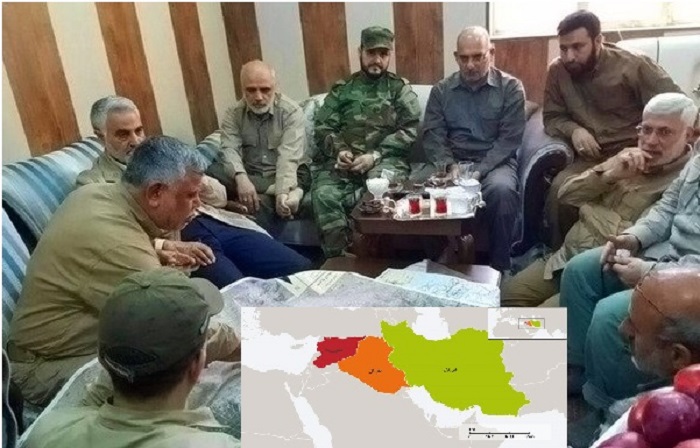
Qasem Soleimani, head of the terrorist Quds Force, discussing Iraq situation with heads of terrorist paramilitary forces in Iraq- File Photo
As uprising mounts in Iraq against corruption and the Iranian regime’s meddling, the situation in this country and especially the rising number of casualties raises international concern. Based on reports from the Human Rights Committee of the Iraqi Parliament, up to this time, more than 300 people have been killed and thousands injured.
On November 10, 2019, a Statement from the White House Press Secretary read:
“The United States is seriously concerned by continued attacks against protestors, civic activists, and the media, as well as restrictions on Internet access, in Iraq. Iraqis won’t stand by as the Iranian regime drains their resources and uses armed groups and political allies to stop them from peacefully expressing their views. Despite being targeted with lethal violence and denied access to the Internet, the Iraqi people have made their voices heard, calling for elections and election reforms. The United States joins the UN Assistance Mission to Iraq in calling on the Iraqi government to halt the violence against protesters and fulfill President Salih’s promise to pass electoral reform and hold early elections. We also call on the rest of the international community to join us in supporting a better future for the Iraqi people.”
The uprising in #Iraq show their anger against the poor economic and social situation in their countryhttps://t.co/qKhLhoZftK#WeSupportMEK #MEK #FreeIran @USAdarFarsi pic.twitter.com/OxMtPoAVoq
— MEK Iran (Mujahedin-e Khalq) (@MEK_Iran) October 8, 2019
The US Secretary of State, Mike Pompeo, in a Tweet on November 5th said:
“The Iraqi and Lebanese people want their countries back. They are discovering that the Iranian regime’s top export is corruption, badly disguised as revolution. Iraq and Lebanon deserve to set their own countries free from Khamenei’s meddling.”
The spokesperson for the UN High Commissioner for Human Rights said on 8 November 2019:
“We are gravely concerned about continuing reports of deaths and injuries resulting from the use of force by security forces against demonstrators, as well as deliberate killings by armed elements in Iraq. Between 1 October and last night, the Human Rights Office for the UN Assistance Mission for Iraq has documented 269 deaths in the context of demonstrations across the country. At least 8,000 others have reportedly been injured, including members of the Iraqi security forces. The exact casualty figures may be much higher.”
Referring to the Paramilitary groups affiliated to the Iranian regime the Spokesperson added:
“The majority of the casualties have resulted from the use of live ammunition by security forces and armed elements, described by many as private militia groups, as well as the unnecessary, disproportionate or improper use of less-lethal weapons such as tear gas.”
The Sky Press reported that Mrs. Jenine Henis, the UN Special Envoy to Iraq, met Ali Sistani, the highest religious leader, in Iraq on 11 November 2019 in Najaf. This meeting was in relation to the current crisis in Iran.
The Iranian regime considers Iraq, Lebanon, Yemen, and Syria as its “strategic depth”. Ali Khamenei, the supreme leader of the religious dictatorship ruling Iran, has repeatedly said that if the regime does not fight in Syria, Lebanon, and Yemen, it has to fight in Tehran, Isfahan, and Shiraz. Many analysts believe that ceasing the Iranian regime’s meddling in Iraq, eventually leads to the collapse of the regime in Tehran.
… just weeks after mass demonstrations across #Iraq over the regime’s meddling in their country through the government and their proxy militias. https://t.co/hzGgL98KU1 #Iranfreedom #freeiran #MEK #Iran@USAdarFarsi@threadreaderapp#Unroll
— Iran News Update (@IranNewsUpdate1) October 21, 2019
Mrs. Maryam Rajavi, the President-elect of the National Council of Resistance of Iran, warned in 2005 that the danger of the Iranian regime’s meddling in the region was a hundred times worse than its nuclear threat; a sad reality that now the world realizes.
Time and again, the MEK has warned the international community that appeasing mullahs ultimately, emboldens them and pushes the region and the world toward bloodshed that has to be stopped now.
